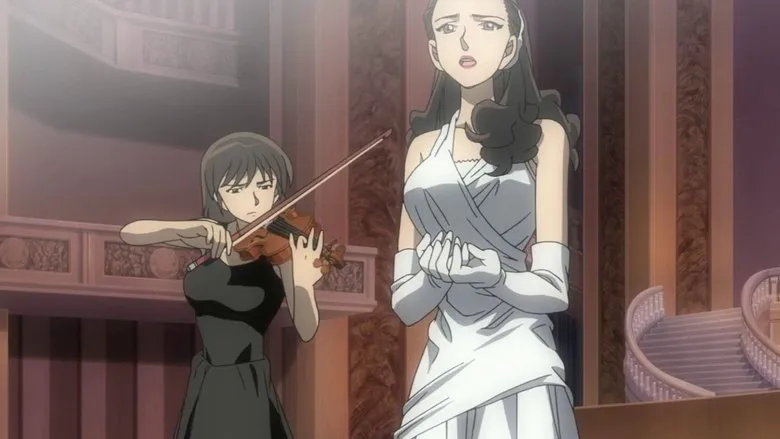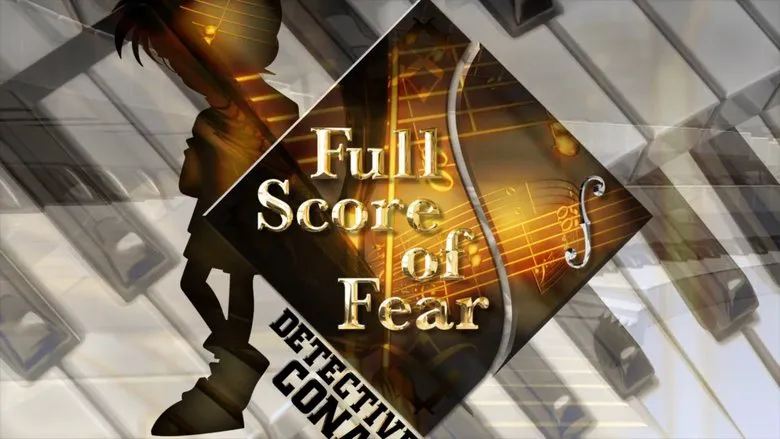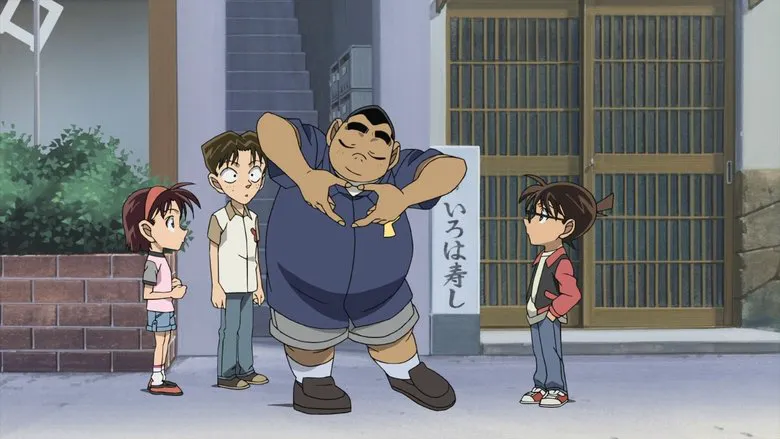It’s been a while since we’ve seen stories of musically inclined young people grace the animation world, particularly those immersed in the realm of classical music. One anime series that attempted to capture this essence was Sound! Euphonium. Produced by Kyoto Animation (KyoAni), the studio famed for K-On!, Sound! Euphonium garnered considerable popularity. However, despite its visual appeal, it arguably lacked the artistic depth of Nodame Cantabile.

Sound! Euphonium
While Sound! Euphonium undoubtedly features musical elements, it often felt more like a high school drama with a classical music backdrop. The story revolves around Kumiko, an indecisive young woman who almost accidentally finds herself playing the euphonium. Asuka grapples with complex social interactions while carefully concealing her emotions. Trumpeter Reina Kousaka, driven by ambition, fervently competes for the solo in Rimsky-Korsakov’s Scheherazade, a standout piece in the series, embodying the belief “I must become someone special.” Throughout, a wholehearted dedication to music is not as present as expected. A memorable moment occurs when Kitauji High School band, including the protagonists, performs a band arrangement of Y.M.O.'s 1980s hit RYDEEN during a marching band performance.
Anime Series Exploring Music
Several other series delve into music, each offering a unique perspective.
La Corda d’Oro

La Corda d'Oro
La Corda d’Oro adopts a closer relationship with classical music. Adapted from a game, this reverse harem anime centers on Hino, a Cinderella-esque figure gifted a magical violin. Through diligent practice, she captures the hearts of handsome young men associated with elements of moon, wood, water, fire, and earth. They personify various archetypes and musical styles. There’s the rational musical prodigy with familial expectations, the affluent dilettante pursuing music as a hobby, the eccentric genius deeply enmeshed in musical exploration, the energetic enthusiast spurred by a senior’s trumpet, and the introverted musical genius. In its supporting cast are music teachers etc. providing many angles to explore the many approaches and attitudes toward music. Hino wins them over by lovingly and dedicating herself into her violin playing.
Gankutsuou: The Count of Monte Cristo

Gankutsuou: The Count of Monte Cristo
People pursue music for diverse motivations. In Gankutsuou: The Count of Monte Cristo, adapted from the sci-fi work The Stars My Destination and Alexandre Dumas’s classic The Count of Monte Cristo, a young woman aspires to become a pianist to escape a pretentious family. While her debut performance of Rachmaninoff’s Piano Concerto No. 2 in C minor, Op. 18, intended to express love for her fiancé, is part of a villain’s conspiracy, she eventually breaks free from her nightmare and finds success as a concert performer.
Detective Conan: Full Score of Fear

Detective Conan: Full Score of Fear
Rachmaninoff’s piece is often linked with love, and its meaning often holds the key to a narrative. In Detective Conan: Full Score of Fear, “Amazing Grace” becomes central to the entire film as its theme of forgiveness is explored by the music used. The soprano Reiko Akiha’s perfect pitch is pivotal in solving the crime, and following her musical partner’s death, she chooses self-forgiveness for the people who killed him out of jealousy through experiencing and performing the emotional hymn.
The Pursuit of Musical Mastery
Nodame Cantabile

Nodame Cantabile
Nodame Cantabile shines as the anime series that captures the spirit of approaching music with pure focus and an enduring commitment to its study. Shinichi Chiaki, hailing from a line of well-known pianists, is torn between inheriting his mother’s entrepreneurial business and becoming something of a drone on piano at the music academy – but he is adamant about his dreams of becoming a conductor.
Chiaki is also a musical talent evaluator, soon discovering his mess-prone neighbor, Megumi Noda (Nodame), is also a free-spirited piano prodigy. While he initially struggles to whether he is attracted to her talent or personhood, Nodame’s only ambitions are to eat, drink, and play freely on the piano (Gershwin’s Rhapsody in Blue captures her style perfectly!). Later, on discovering Mozart’s Sonata for Two Pianos in D major, K. 448/375a with Chiaki, she develops deeper feelings. The enigmatic maestro’s advice, “You can’t be with Chiaki the way you are now,” prompts her to change herself and participate in piano competitions and study in Europe to be with the man she has healed.
In turn, Nodame matures as a person and is inspired to merge closer with the musicality with composer and composition, while Chiaki can grow and learn to manage emotional aspects as well.
The road of music is fraught with challenges and reversals in love. Nodame learns to read music – no longer relying on memory only – approaching each interaction with the music with “trying to date someone I’ve never dated before!” Following in-depth studies abroad, she learns musical analysis, adopting to play in accordance with the composer rather than her whims.
Chiaki is forced to go through life with constant annotations and analysis of life itself, as he needs to find emotional solutions to long-buried fears and barriers. He experiences emotional insecurities related to his parents. Though partnered with the enthusiastic girl Nodame, her untamed essence manages to loosen his knotted nerves of musicality.
Chiaki also goes from not caring if this life partner succeeds or fails to caring for her in most challenging artistic journeys. All is in hopes that one the are dating remains a success and it evolves closer than a match made from the Gods themselves! The inspiration behind Chinaki lies with the real Tomomi Nishimoto, who experienced high levels of success at a young age – for one possible reason her love has reached such realism!
Your Lie in April and Piano Forest
Other anime often favor Nodame-leaning archetypes and visuals alone – in the case of Your Lie in April and Piano Forest, their visuals are exquisite. A number in Nodame Cantabile were repurposed, such as Beethoven’s Moonlight Sonata’s 3rd Movement.
Kaori follows the Nodame approach; her wild performance gets the audience’s love though not from judging. As mentioned, the journey ends, influencing Kousei learns emotional lessons into him.
Piano Forest adds Kai to Nodame-like characters, with love audiences, while confusing judges. He receives top guidance and tutoring, who overshadows and beats Shuhei-- the Chinaki stand-in.
Beyond Genius: The Reality of Musical Talent
Geniuses are far and in-between, while most youthful of music talent is average. In Gauche the Cellist, Beethoven’s Pastoral Symphony out of practice. Eventually a cat… mouse improves his essence and confidence.
Some classical musical can be only street performers. In the short One Man Band, fierce fights over a dollar ensue.
Talent is just what it appears to be.